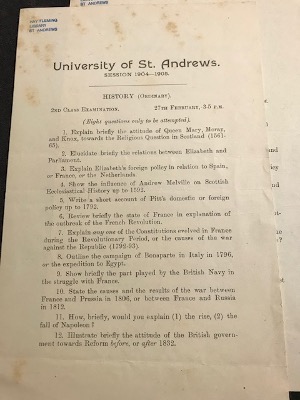Past History Papers: 1905
Looking at past papers can offer a great deal of insight into the ways that History was taught, studied and examined in the early years of the twentieth century, when history at the University of St Andrews was still a relatively young discipline with very few students and staff members. In this post I will be examining several exam papers from the 1904-5 session at the university, with a particular focus on the content that was being tested, to understand how history was taught at St Andrews during this time and how it relates to the wider trends of the history degree at the university throughout the century.

The biggest difference between then and now is in the sheer number of questions. In 1905, students were given 3 hours to attempt 8 questions, amounting to about 22 minutes to answer each question. This is a far cry from history examinations today, where students are generally given an hour to answer each question. This necessitates that the answers to the questions from the 1905 paper were intended to be shorter and less detailed, providing a broad overview of a certain event, figure, trend, etc. This indicates that there was a conceptual change in the way that history was studied, as it developed to become more analytical throughout the century.
The content of the paper is also quite different to modern day papers. The questions from the papers that I looked were almost all about Political, Military and Religious History and there was no mention of less conventional forms of history, such as Gender or Social History. This is unsurprising as history at this time was still a young discipline, less conventional schools of history, such as Marxist History or the Annales, had yet to be popularised and spread to academic history. Furthermore, early twentieth century Britain was a society that was rife with social, gender and racial inequalities. The first female student to graduate with a degree in history was only recorded in 1904, so it is not shocking that the curriculum was focused on typically male dominated institutions such as the monarchy and church.
In terms of the content that was included, all of the papers I looked at were focused on modern European History, going from the early sixteenth century to the late nineteenth. There was lots of focus on Western Europe, particularly on English, and to a lesser extent, Scottish Monarchy, European military conflicts and the Reformation. This is exactly the kind of conventional history that I had expected to be studied at this time, before the history of non-political and marginalised populations was frequently studied at universities. The subject was still in its early days at St Andrews, with few staff and students. It is likely that there wouldn’t have been a great range of history being taught or a range of staff with different specialities. However, the content being tested on is still frequently taught today and, apart from the number of questions to be answered and the exclusion of non-political forms of history, the papers were still fairly similar to the ones that we sit today.
Sources
- 1905 Honours History Examination – ms38977/6/1/1/1/10
- 1905 Ordinary History Examination – ms38977/6/1/1/1/10
This post was written in 2021 by Amanda Stewart, who was then going into her third year studying History at the University of St Andrews.
This post is part of a collection examining the establishment of the History degree at St Andrews, looking at the increasing number of staff and students and the gender balance of those graduating with a degree in history. You can also learn about the progression of the history degree in the twentieth century or the or the first joint honours in History. To learn more about the past paper exams from key decades throughout the twentieth century, follow these links: 1950s Past Paper, 1970s Past Paper, and 1980s/90s Past Paper, and the style and format of past papers.
